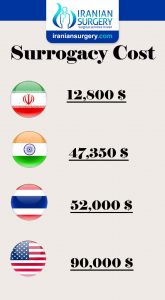Surrogacy Clinics in Iran
How much does Surrogacy cost in Iran?
The average cost of surrogacy in Iran is around $9,000 and the cost of Surrogacy with IVF and egg donation in Iran is around $ 13800.
The cost of surrogacy depends on the type of treatment required and whether this includes IVF, ICSI or IUI. In addition, you will be required to pay a fee for the administration, coordination and support throughout the treatment program.
Is surrogacy Allowed in Iran and Islam?
Yes, surrogacy is permitted in Iran. Most Shia scholars have issued jurisprudential decrees (fatwas) that allow surrogacy as a treatment for infertility, but only for legally married couples. The Islamic Consultative Assembly (the Iranian Parliament) passed a law allowing surrogacy for infertile couples, which the Guardian Council also approved. They view this practice as transferring an embryo or fetus from one womb to another, which is not forbidden in Shia jurisprudence. Currently, there are about 70 infertility clinics in Iran that offer gestational surrogacy. Therefore, sperm donation, egg donation, and surrogacy are permitted in both Islam and Iran.

Surrogacy Laws in Iran
All surrogacy arrangements (both commercial and altruistic) are legal and popular. Many Middle Eastern couples use surrogacy due to legal ease in Iran.
If you decide to have a Surrogacy in Iran, reading this article can greatly increase your information about the cost of surrogacy in Iran and help you choose the best city and hospital for surrogacy in Iran.
The Role of Islamic Jurisprudence in Surrogacy
Islamic perspective and moral concerns
Gestational surrogacy is being performed as a treatment for infertility in some well-known medical centers in Tehran and other cities in Iran. While the majority of the world’s Muslims are Sunni, the majority of Iranians are Shia. Most Sunni scholars do not allow surrogacy because it involves inserting a man’s sperm into the womb of a woman he is not married to. However, most Shia scholars have issued Jurisprudential Decrees (fatwas) that allow surrogacy as a treatment for infertility, but only for legal couples. They consider this practice as transferring an embryo or fetus from one womb to another, which is not forbidden in Shiite jurisprudence. However, there is disagreement on some issues such as kinship and inheritance. The main ethical concern with gestational surrogacy is the monetary relationship between the intended couple and the surrogate mother.
While monetary rewards are practiced in Iran and permitted by religious authorities, they appear to suffer from ethical problems. We suggest that this type of monetary relationship should be adjusted and confined to the reimbursement of ordinary expenses. Such adjustments require new legislation and religious decrees.
Different Types of Surrogacy in Iran?
The term “surrogacy” is commonly used to describe several different scenarios.
. A traditional surrogate both donates her eggs and carries a pregnancy for an individual or couple. The pregnancy is usually achieved through intrauterine insemination (IUI) with the intended father’s sperm. Donor sperm may also be used.
. A gestational carrier carries a pregnancy for an individual or couple using an egg that is not the carrier’s. The egg may come from the intended mother or a donor. Likewise, sperm may come from the intended father or a donor. Pregnancy is achieved through in vitro fertilization (IVF) in Iran.
Gestational carriers are now more common than traditional surrogates. What is the reason for this change? Because a traditional surrogate donates her egg, she is technically the biological mother of the child. Although this arrangement can work well, it may also lead to complex legal and emotional challenges.

General information about Surrogacy in Iran
General information | |
| Cost | vary from person to person |
| Anesthesia | No |
| Hospital stay | 1 day |
| Back to work | 7 to 10 days |
| Duration of operation | 1 to2 hours |
| Minimum stay in Iran | Several months |

Free Consultation
Read more about : PGD in Iran
Read more about : PGS in Iran.
What Is the Ideal Age for a Surrogate Mother?
The suitable age range for a surrogate mother is a minimum of 21 years to a maximum of 38 years.
What Is the Surrogacy Process Step-By-Step?
In Iran, surrogacy is carried out in 8 stages:
. Finding the right fertility center
The first step in surrogacy is choosing a good fertility clinic.
. Medical examinations
The intended parents and the surrogate should both undergo medical and physical examinations, most of which are conducted by clinic specialists.
. Genetic counseling
Genetic counseling is one of the most important stages of surrogacy because genetic diseases and disorders of both parties are identified during the counseling sessions.
. Getting legal advice
Getting legal advice and being aware of surrogacy regulations and conventions will end most concerns about the legal issues of this procedure.
. Choosing an egg donor
If the couple needs a donor egg for surrogacy, they can either get it from the egg bank of the infertility center or request an egg donation. It should be noted that the egg donor must undergo clinical screening before donating eggs.
. Choosing a surrogate
The couple can find a surrogate on their own or choose one of the surrogates offered by the infertility center. In any case, the gestational surrogate must undergo medical and psychiatric tests and provide the doctor with a complete medical history.
. Medical process
Before starting the surrogacy process, one of the assisted reproduction methods, such as IUI or IVF, should be chosen to fertilize the egg. Once doctors fertilize the egg, it can be transferred to the surrogate’s uterus.
. Pregnancy and Birth
About fifteen days after the embryo transfer, the surrogate must take a pregnancy test to confirm the pregnancy. If the surrogate becomes pregnant, she will be under the full support of the infertility center team and, of course, the biological parents. Finally, after the baby is born, it is delivered to the intended parents according to the agreement.

________________________________________________________________________________________
Advanced diagnosis and treatment
Our team is a leader in advanced infertility treatments, including oocyte preservation, fertility preservation, and treatment of uterine fibroids and endometriosis. So, you can freeze oocytes to create an appropriate number of embryos. The Iranian Surgery team is constantly assessing the latest evidence in fertility treatments to give you the best options while minimizing delays and unnecessary tests.
General information about Surrogacy in Iran

An Islamic view and ethical concerns
Gestational surrogacy as a treatment for infertility is being practiced in some well-known medical institutions in Tehran and some other cities in Iran. While the
Majority of Muslims in the world are Sunni, the majority of Iranians are Shiite. Most Sunni scholars do not permit surrogate motherhood, since it involves introducing the sperm of a man into the uterus of a woman to whom he is not married. Most Shiite scholars, however, have issued jurisprudential decrees (fatwas) that allow surrogate motherhood as a treatment for infertility, albeit only for legal couples. They regard this practice as transferring an embryo or fetus from one womb to another, which is not forbidden in Shiite jurisprudence. Nevertheless, there are some controversies concerning some issues such as kinship and inheritance. The main ethical concern of Iran’s experience with gestational surrogacy is the monetary relation between the intended couple and the surrogate mother. While monetary remuneration is practiced in Iran and allowed by religious authorities, it seems to suffer from ethical problems. This article proposes that this kind of monetary relation should be modified and limited to reimbursement of normal costs. Such modification requires new legislation and religious decrees.
Success Stories: Experiences with Surrogacy in Iran
Nadia’s successful experience of surrogacy and egg donation in Iran (2022)
Nadia had a hysterectomy due to a past medical problem and came to us for surrogacy. We will share her treatment journey in Iran, including ultrasound and BHCG test results that indicate a positive pregnancy.
Read more about Nadia’s successful experience with surrogacy and egg donation in Iran (2022 review)
What Is the Success Rate of Surrogacy?
Before the IVF procedure, several medical evaluations are performed on the surrogate to ensure that her body is ready to receive the embryo. Therefore, once doctors confirm pregnancy, the chance of having a healthy baby is over 95%. However, some factors affect the success rate of surrogacy, including:
. Sperm and egg quality.
. The age of the surrogate and biological parents.
. The process of egg fertilization.
. The surrogate’s physical ability to carry a baby for 9 months.
. In the case of egg donation, the age and health condition of the egg donor.
. The clinic equipment and the expertise of the doctor who transfers the embryo.
For more information about Surrogacy in Iran, do not hesitate to contact our support team.

While there are many surrogacy pros for intended parents, there are also some disadvantages of surrogacy for hopeful parents to consider:
- Surrogacy can be complicated. Gestational surrogacy involves complex medical procedures, and surrogacy laws. Legal processes can be overwhelming at times. It is important to work closely with a trusted professional like Southern Surrogacy to ensure the process is completed safely and legally.
- Surrogacy costs can be significant. Because of the number of people and services required to complete a successful surrogacy, surrogacy can be expensive.
- Surrogacy requires you to let go of some control. While intended parents typically enjoy a greater sense of control and involvement than families pursuing adoption, you will need to relinquish some control and trust your surrogate to carry the pregnancy for you.
People also ask about surrogacy in Iran
The success rate of surrogacy depends on the following factors:
A clinic where the surrogacy procedure is performed.
Physiological condition of the surrogate mother
How healthy the sperms and eggs of the intended parents are
Method used
But here at Iranian Surgery, by taking into account all the factors and choosing the right candidate, we have been able to improve the chance of success up to 80%.
Shiraz. At the moment all-inclusive surrogacy package in Shiraz city is around 13000 $.
The possibility of accepting a surrogate depends on various factors, including her age. If the surrogate has to use her own eggs, additional tests may be needed to assess her egg reserve. Depending on the surrogate's age and her results, a fertility specialist will be able to discuss the success rate you should expect from your treatment. As with any fertility treatment, the success rate decreases with the age of the egg donor, especially after the age of 35.
There are many reasons why people choose surrogacy:
. Health issues prevent women from becoming pregnant or carrying a pregnancy to term.
. Infertility issues such as frequent miscarriages make couples unable to conceive or stay pregnant.
. Single people want to have biological children.
. Same-sex couples want to have children. It can be two men, but women also find this option attractive because one partner's egg and embryo can be transferred and carried by the other.




14 Comments
Hello,
I need some information about surrogacy. If you receive my email please reply me back so we proceed further communication.
Regards
Nadia
hello Nadia what kind of information do you need regarding surrogacy?
Hi
I want to be contact. I want to know price for regarding surrogacy. Would you please abswer me?
I need more information about surrogacy. Please contact me on my email ID.
hello dear dive, for more information about surrogacy in Iran you can contact us on WhatsApp. this is my whatsApp number +989019290946. thank you
I want a second child. One of my children is a Muslim. I like him very much. I am in China. I hope to have a second Muslim child.My address is Lixia District, Jinan City, Shandong Province, China
Salam,
I am a male 40 years old we have struggled to have a child now we want to take our chances for the surrogacy can you please relate the approximate cost for surrogacy.
Regards
this procedure (surrogacy) is available by us at the best hospitals and clinics in Iran.
as for the price you should know if you need IVF with Donor from us alongside with surrogacy the full package would cost 9000USD
this price is for the start till the end of the procedure meaning from start till baby born.
if you don’t need a donor or you bring donor from your own country the price will be 7500 to 8000 usd.
Hello my name is maria and i would be interested in the surrogate program with a donated embryo and would like to know if the 9,000 was for that option also do u have a guaranteed surrogate program where u guarantee the baby if its thru a donor embryo if so would it still be the same price i am very interetested in this option and would also like to know what else would be required living in the usa to bring the baby after they are born and thank you in advance
At the moment the cost of the all-inclusive surrogacy package in Iran starts at 12800 USD.
Hello
Can foreigners legally have recourse to Iranian surrogate mothers?
Both altruistic (unpaid) and commercial (paid) surrogacy is completely legal in Iran and foreigners can legally have Iranian surrogate mothers.
Are you exploring your options for growing your family through surrogacy? Contact our consultant via Whatsapp number +98 922 176 2312 . It’s a free service.
Hello i was interested in knowing more information for the surrogate program using a donor embryo transfer instead of using both egg n sperm donor i would like to know more about the process price and if its possible for an american to do it using an iranian surrogate with a donor embryo and thank you
Hello my name is maria and i would be interested in the surrogate program with a donated embryo and would like to know if the 9,000 was for that option also do u have a guaranteed surrogate program where u guarantee the baby if its thru a donor embryo if so would it still be the same price i am very interetested in this option and would also like to know what else would be required living in the usa to bring the baby after they are born and thank you in advance